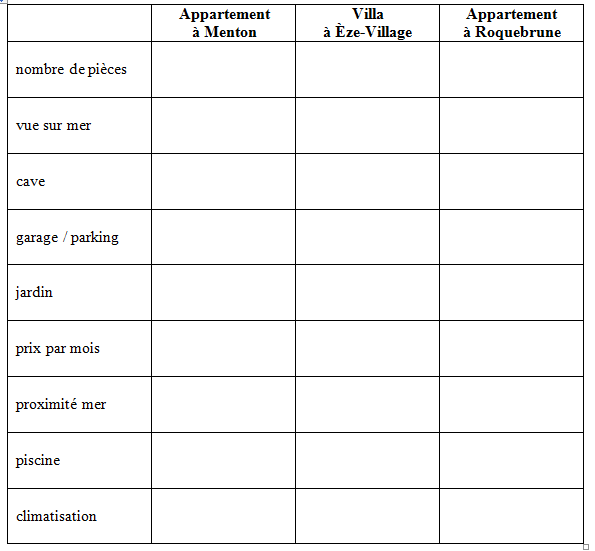You are going by train to Siena and your traveling companion has a lot of questions. Complete your responses using the pronoun ne or the adverb ci, according to the context.
—Vai spesso in città?
—No, non __________ vado quasi mai.
ci
You might also like to view...
Arielle has accepted a fabulous job in Monte Carlo and she is looking to rent an apartment just outside of the city. She calls a real estate agency advertising three places that she wants to see. Listen to her conversation twice. The first time try to understand the meaning, the second time fill the columns corresponding to each apartment with as much information as you hear.
Arielle has accepted a fabulous job in Monte Carlo and she is looking to rent an apartment just outside of the city. She calls a real estate agency advertising three places that she wants to see. Listen to her conversation twice. The first time try to understand the meaning, the second time fill the columns corresponding to each apartment with as much information as you hear.
— Alors, Mademoiselle, vous m’avez dit l’appartement à Menton?
— Oui, le trois pièces au dernier étage, dans la résidence avec piscine. Superbe cuisine équipée, cave, garage… Il n’y a pas de prix.
— Un moment, s’il vous plaît… Ah oui, le voilà, c’est bien ça. C’est 2000 euros par mois.
— 2000 euros? Non, c’est trop cher. Et la villa à Èze-Village… Villa de charme,
4 pièces, 100 m2 de jardin. Pas de garage, mais bon ça va.
— Ah oui… Elle est splendide. C’est une villa avec vue panoramique sur la mer et climatisation.
— C’est peut-être un peu trop grand.
— J’ai aussi un deux pièces à Roquebrune dans un quartier calme, au bord de mer. Il a une grande terrasse de 25m2 avec vue sur la mer. Il est très ensoleillé et il y a une cave et un parking… Seulement 1500 euros par mois.
— Bon, ça semble intéressant. Je pourrais le visiter?

Nous _______________ (pouvoir) partir dès que je l’aurai vue.
Fill in the blank(s) with the appropriate word(s).
Información personal Fill in the blanks with the missing word.
Marcos: Hola, ¿cómo te (1) ________________________________? Víctor: Me (2) ________________________________ Víctor. ¿Y tú? Marcos: Yo (3) ________________________________ Marcos. Víctor: ¿(4) ________________________________vives, Marcos? Marcos: (5) ________________________________ en el barrio Amistad. Víctor: ¡Yo también (me too)! ¿Cuál es tu (6) ________________________________? Marcos: Es Avenida Cruz 26.
Which of the following examples illustrates a fragment, run-on (or fused) sentence, or comma splice?
A) Clara was sympathetic because Bill was so cute. B) Because Bill was so cute, Clara was sympathetic. C) Although Clara was sympathetic because Bill was so cute. D) Clara was sympathetic; indeed Bill was really cute.